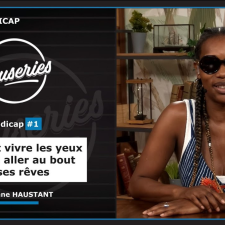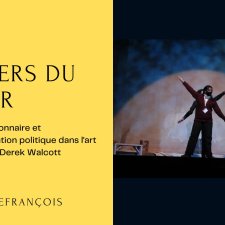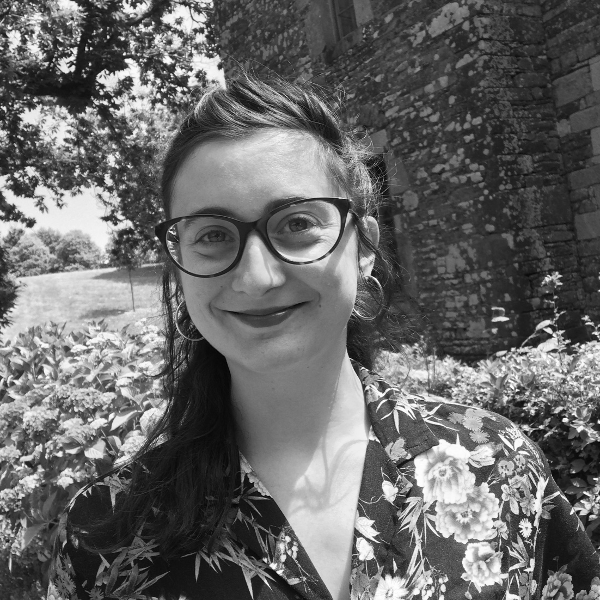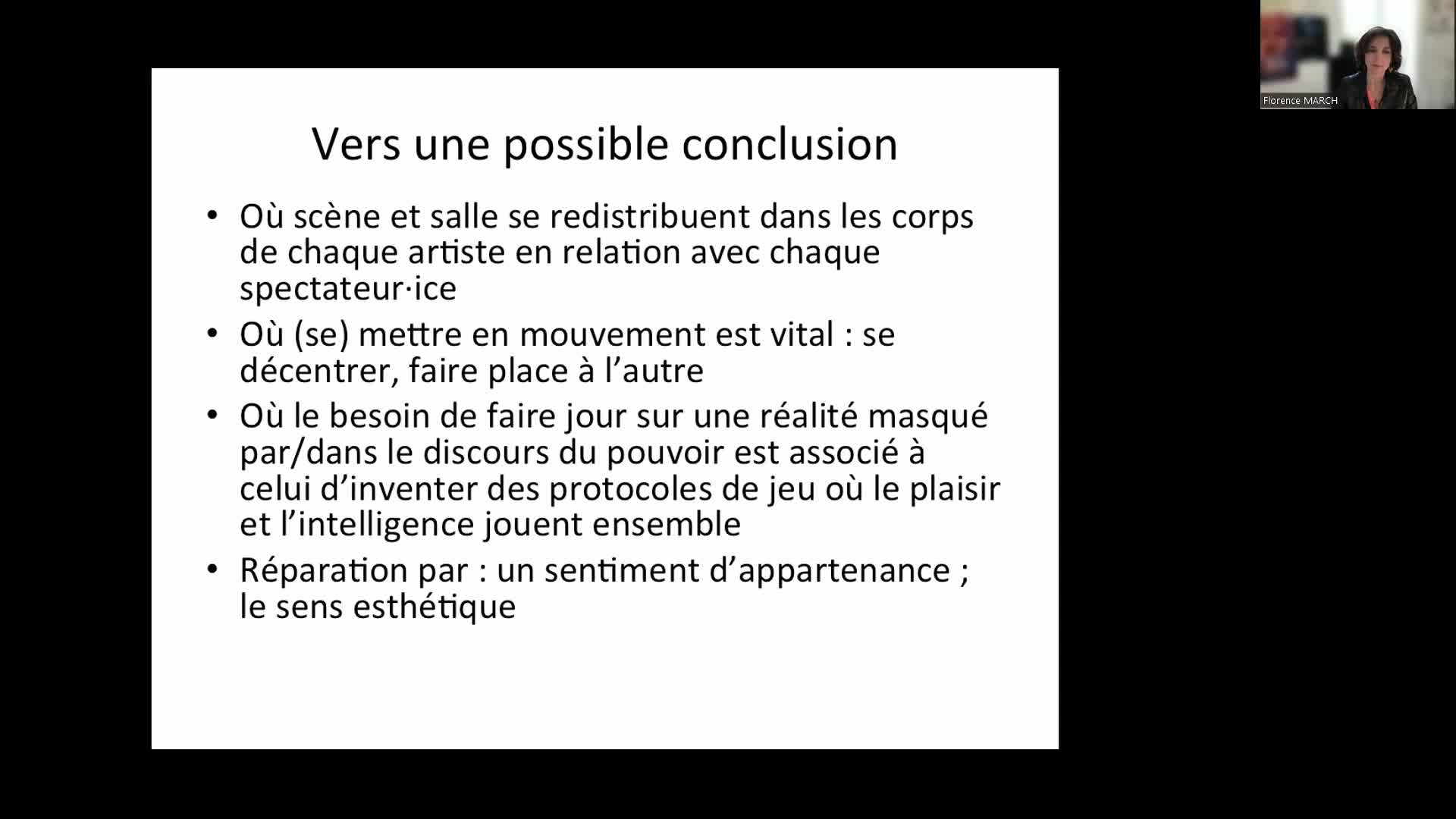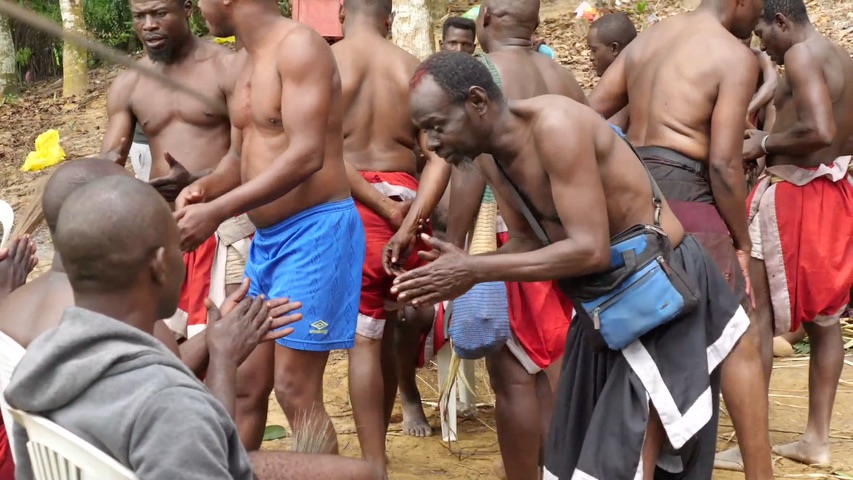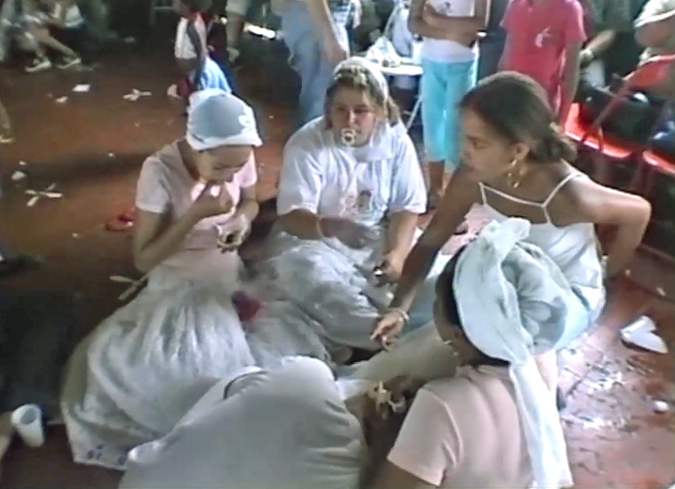Notice
“Beneficial JI” - Short talk 2.2: Julien Laroche - Being together when time is improvised: interactive coordination in pedagogical improvisations
- document 1 document 2 document 3
- niveau 1 niveau 2 niveau 3
Descriptif
Improvising music toghether involves coping in realtimewith unprecedented patterns of behavior of another. The goal is to achieve and share a meaningful coperformance,and this is done by interacting.Therefore, processes underlying improvisation cannot be fully grasped by musical analysis only. Behavioralpatterns and collective dynamics that underlie joint improvisation encourage the scientific study of thecoperformanceitself. This is important to understand how improvisers can coordinate their behavior together in a meaningful fashion. However, improvising is first and foremost a practice that requires learning,experience and expertise. Objective measurements aren’t sufficient : integrating the phenomenologicalpoint of view of the improviser is also necessary. For this reason, we work as a dyad of researchers: acognitive scientist, and a professor of pedagogy who makes use of improvisation to foster learning. We thentrack interactive processes underlying joint improvisation during their very learning by novices and with theguidance of an expert. In this talk, we describe our pedagogical method of interactive improvisation (theKaddouch pedagogy) and its underlying system of thought. We present our system of qualitative analyses ofmusical interactionsand frame our observations during lessons in a dynamical, enactive framework. Then, we show how wecapture interaction processes by quantitative and dynamical analysis. More specifically, we are currentlyinterested in the coordination of tempo fluctuations during performance. On the basis of our concepts,observations and results, we discuss the role of the process of interaction as a source of coordinationbetween improvisers’ behavior.
Intervention / Responsable scientifique
Thème
Documentation
Liens
Dans la même collection
-
Joint Improvisation Meetings 2015
We understand joint improvisation as an artistic form involving two or more performers engaging in multiple real-time interactions: with each other, with the audience and with the emerging content.
-
“Quantifying JI” Short talk 1.3: Ashley Walton - Musical Improvisation: Spatiotemporal patterns of …
WaltonAshleyWhen jazz musicians perform an improvisational piece of music their behaviors are not fully prescribed in advance. Nonetheless their actions become so tightly coordinated and their decisions so
-
“Beneficial JI” - Short talk 2.3: Rachel-Shlmoit Brezis - Testing the limits – and potential of joi…
Shlmoit-BrezisRachelResearch on joint improvisation has shown that expert improvisers, as well as neurotypical individuals, canjointly create novel complex motion, synchronized to less than 180ms.
-
Going into the unknown in science and art
KeysersChristianScientists must grope into the undefined place beyond the known. So must improvisation theater actorswalking onto the stage with no idea what will happen next. Improvisation theater developed
-
Deconstructing “joint improvisation”
BrownStevenWhat is “joint” and what is “improvisational” about joint improvisation? The “joint” aspect can be contrastedwith solo improvisation, such as that of a jazz pianist. Even when jazz pianists improvise
-
“Quantifying JI”Short talk 1.1: Saul Albert - Extemporary movement: an interactional account of par…
AlbertSaulClear empirical distinctions can be drawn between joint improvisation and choreography in dance by exploring the rhythmical coordination of dancers and audience members in a partner dance performance
-
How much do jazz improvisers share understanding with each other and with their listeners?
SchoberMichael F.To what extent do collaborating improvisers understand what they are doing in the same way as each other?And to what extent do their listeners understand the improvisation in the same way as the
-
Improvising in Sign Language and Gestures
CitronAtiThe Sign Language Theatre Laboratory is a practicebasedartistic research group that began operating in2014 as part of the Grammar of the Body (GRAMBY) Interdisciplinary Research Project led by
-
-
-
Brain to Brain approaches to joint actions
KeysersChristianJoint actions require an ability to understand and predict the actions of others far enough into the future to have time to plan and execute matching motor programs. Here I will review experiments in
-
From me and you to we: how our brain integrates our actions and emotions when we interact
GazzolaValeriaIt is now well known that areas in the brain that are active when we act or feel become active again when weobserve other people act and express their emotions – as if we would internally relivewhat
Sur le même thème
-
Danse et handicap #1 - Danser et vivre les yeux fermés : aller au bout de ses rêves
HaustantFabienneDanse et handicap #1 - Danser et vivre les yeux fermés : aller au bout de ses rêves
-
L'envers du décor: rhéthorique visionnaire et instrumentalisation politique dans l'art dramatique d…
LefrançoisFrédéricL'envers du décor: rhéthorique visionnaire et instrumentalisation politique dans l'art dramatique de Derek Walcott
-
Faire exister les nouvelles attentions : atelier de Julie Perrin et Pascale Gille
PerrinJulieGillePascalePar un atelier et une discussion, Julie Perrin et Pascale Gille soulignent comment les danseurs et danseuses continuent de faire bouger les lignes du "partage du sensible", en jouant de la frontière
-
Faire corps avec le document : les chorégraphes contemporains face aux crises et aux conflits
Cette communication se centre autour de pièces chorégraphiques qui abordent des situations de crises politiques, économiques, humaines, à travers des matériaux documentaires. Il s’agit de dresser un
-
Les formes de réparation dans les arts de la scène à l’épreuve de la Covid-19 (visio)
RiedlerJulietteBurighelGiuseppeLe webinaire propose un retour sur la journée d’étude et de pratiques artistiques " Les formes de réparation dans les arts de la scène à l’épreuve de la Covid-19 " (qui s’est déroulé le 23 mars 2022 –
-
Après la projection - Discussion autour de « Faraway My Shadow Wandered » de Liao Jiekai et Sudhee …
CheurfaCéliaJiekaiLiaoLiaoSudheeDiscussion avec les réalisateurs Liao Jiekai et Sudhee Liao, en dialogue avec Jean-Michel Butel, ethnologue, maître de conférences à l'Inalco, spécialiste des évolutions sociales et des structures
-
-
Cérémonies et rituels de l’umbanda : la fête des enfants Marília, État de São Paulo Brésil, les 13 …
JacquemotArmelleTerreiro du Vieux-noir Pai Fabiano, Marília, État de São Paulo (Brésil), les 13 et 14 octobre 2001
-
Corps dansant et corps bourgeois : la fabrique des normes au XIXe siècle
MarquerBertrandJarrasseBénédicteConférences | Vendredi 15 novembre Bertrand Marquer | La norme et l’écart : imaginaire et savoirs du corps au XIXe siècle Bénédicte Jarrasse | Corps-machines : la danse et l
-
-
-














